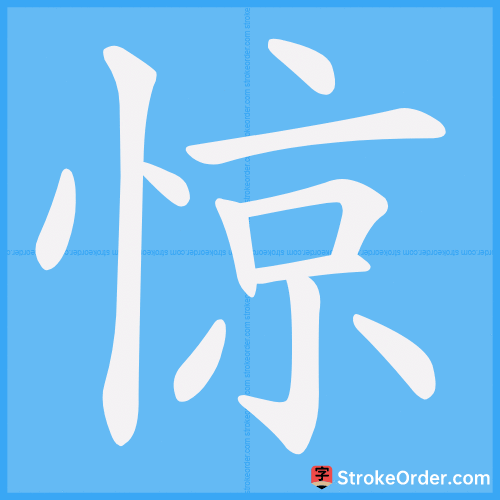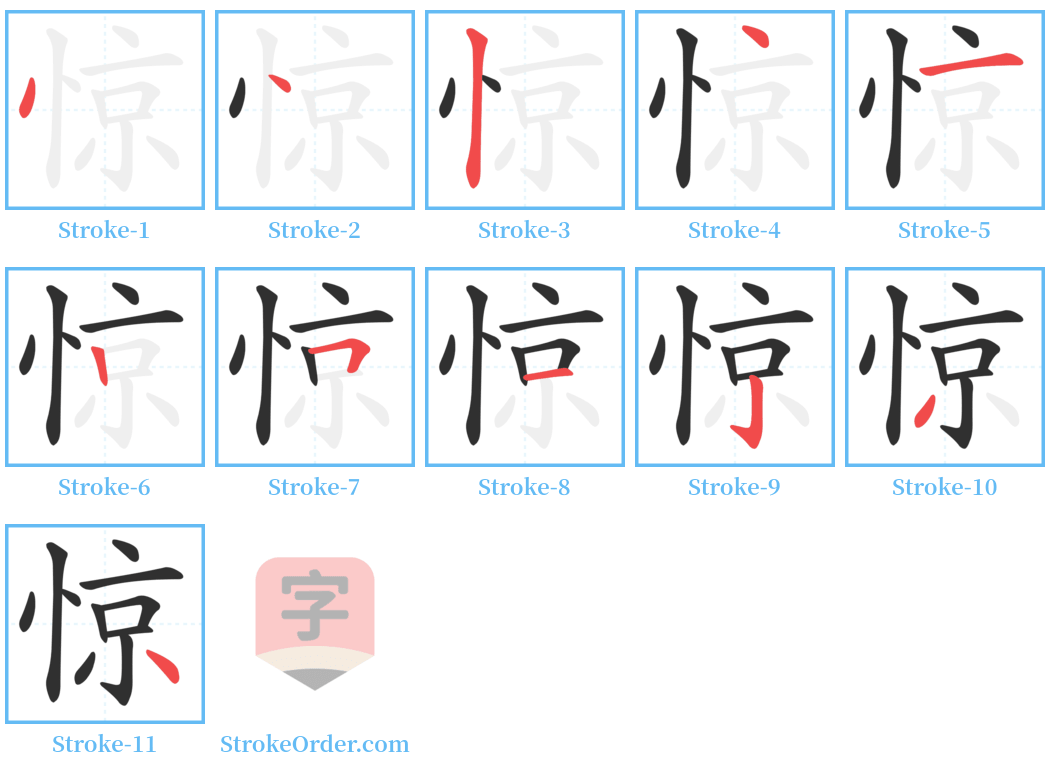惊 Stroke Order
Animated Stroke Order of 惊

Stroke Order Diagrams for 惊

Step-by-Step Handwriting Guide for 惊

Learn to Write Chinese Characters with Video Tutorials
Watch the video of writing the Chinese character "惊", learn the correct stroke order (笔顺) of the character "惊", and master the standard way of writing the character "惊".
Free Printable Handwriting Practice with Stroke Order: 惊
Printable Writing Practice Worksheet of "惊" in Portrait Orientation (Tian Zi Ge)

Printable Writing Practice Worksheet of "惊" in Landscape Orientation (Tian Zi Ge)

Information of 惊
Pinyin
jīng
Radical
忄
Strokes
11 strokes
Usage
★★★★★
Definition
to start / to be frightened / to be scared / alarm
惊
驚 jīng
1. 骡马等因为害怕而狂奔起来不受控制。
(The horse runs out of control due to fear.)
2. 害怕,精神受了突然刺激而紧张不安。
(Fear, the spirit becomes tense and uneasy due to sudden stimulation.)
3. 震动。
(Vibration.)
4. 出人意料的。
(Unexpected.)
1. 骡马等因为害怕而狂奔起来不受控制:~车。~群。马~车败。
(The horse runs out of control due to fear: startled carts, startled crowds; the horse accidentally overturns the cart.)
2. 害怕,精神受了突然刺激而紧张不安:~恐。~骇。~愕。~惶。~诧。~遽。~厥。~悟。~心动魄。~惶失措。~世骇俗(言行出奇,使世人惊恐)。
(Fear, the spirit becomes tense and uneasy due to sudden stimulation: startled fear, shocked, startled confusion, startled surprise, startled anxiety; the heart feels constantly alarmed, panic-stricken, astounded by things that are unexpected.)
3. 震动:~动。~扰。~堂木。打草~蛇。
(Vibration: alarmed movement, disturbed, rattling wood, stirring up a snake.)
4. 出人意料的:~喜。
(Unexpected: sudden joy.)
驚 jīng (verb)
【本义】:马受惊
(The original meaning: horses are frightened.)
【造字法】:形声。从马,敬声。
(Character formation: phonetic and semantic combination, from "horse," sound indicating shock.)
1. 同本义 (the horse be frightened)
引例:
《说文》:驚,马骇也。
(Example from "Shuowen": The character 驚 means horses being frightful.)
《战国策·赵策一》:襄子至桥而马惊。
(In "Zhan Guo Ce": When Xiangzi reaches the bridge, the horse is startled.)
例:
又如:惊嘶(马受惊而嘶叫),惊尘(车马疾驶所扬起的尘土),惊镳(惊马)。
(Examples include startled neighing (horse whinnying when frightened), startled dust (dust raised when carts and horses rush), startled reins (frightened horses).)
2. 惊动;震惊 (alarm; disturb; start; be startled)
引例:
《楚辞·招魂》:宫庭震惊。
(In "Chuci": The palace is shaken.)
《吕氏春秋·慎大》:其生若惊。
(In "Lushi Chunqiu": His life is like alarm.)
例:
又如:惊唬(惊动,吓唬),惊耍(用惊吓的办法开玩笑;耍笑),惊闺(惊闺叶,货郎为招徕顾客而使用的一种手摇响器)。
(Examples include startling fright (alarming, scaring), shocking play (joking by scaring), startling bell (a small bell used by vendors to attract customers).)
3. 动 (move)
引例:
宋·范仲淹《岳阳楼记》:波澜不惊。
(Song dynasty, Fan Zhongyan's "Yueyang Lou Ji": The waves are undisturbed.)
4. 惊慌,恐惧 (alarmed; scared; fear)
引例:
《战国策·燕策》:秦王惊,自引而起。
(In "Zhan Guo Ce": The King of Qin is scared and self-inspired.)
例:
又如:惊恍(惊慌,害怕),惊怖(惊慌恐怖,惊吓),惊报(灾祸的先兆)。
(Examples include startled confusion (panic and fear), scared terror (scared and startled), alarm report (omen of catastrophe).)
5. 惊讶;惊奇 (surprised; amazed)
例:
如:惊厄(惊险;惊困),惊诧(惊讶诧异),惊悼(惊异痛伤)。
(Examples include dangerous surprise (perilous), startled astonishment (surprised), startled lamentation (astounded by grief).)
6. 纷乱 (helter-skelter)
引例:
《吕氏春秋》:莫敢直言,其生若惊。
(In "Lushi Chunqiu": No one dares to speak frankly, their lives are like chaos.)
《侠客行》:细尘障路起,惊花乱眼飘。
(In "Xia Ke Xing": Fine dust rises to block the road, startling flowers and causing eyes to wander.)
lit. a bird startled by the mere twang of a bow (idiom) / fig. sb who frightens easily, due to past experiences
Input Method for 惊
Pinyin
jing1
Wubi
nyiy
Cangjie
pyrf
Zhengma
usjk
Four Corner
90096
Unicode
U+60ca
Same Pronunciation Characters